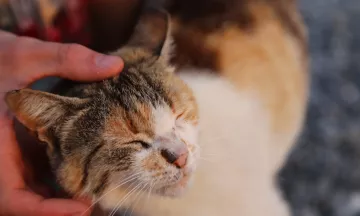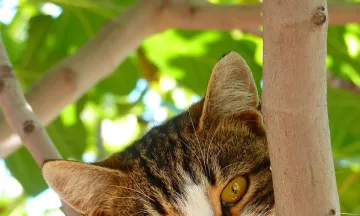What is ‘overgrooming’ in cats?
Overgrooming is when a cat licks their fur too much. It is known as ‘Psychogenic Alopecia’ when the overgrooming has behavioural causes rather than medical.

Why do cats sometimes overgroom?
Cats often overgroom because of stress caused by change, boredom or fear. The act of licking their fur is a way of self-soothing, as it produces calming endorphins in the cat’s brain. As such, cats may groom to excess when they experience big changes to their household or daily routine.
For example, some situations that might lead to overgrooming include:
- Environmental changes such as moving house, furniture rearrangement or home renovation
- Birth of a baby in the family
- A change in their daily routine, such as new food, or moving their litter tray
- Introduction of a new furry family member
- Owner working longer hours
- Change in household members through a divorce, moving, death etc
- Owner taking a holiday
- Not enough daily stimulation or enrichment
- A stressful, loud home environment

How to tell if your cat is overgrooming
Overgrooming can be spotted by patches of very short fur on your cat’s body. For example, this might be on their leg or their belly. At worst, a cat might groom to the point of fur loss, red skin and even nasty sores.

How to stop your cat from overgrooming
Only a vet will be able to diagnose the cause of your cat’s overgrooming, whether medical or behavioural. As such, it’s important to speak to your vet when you spot the signs of overgrooming in case the reason is sickness, allergies or otherwise.
If the grooming is Psychogenic Alopecia, it’s a good idea to identify the source of stress to see if it can be minimised. Otherwise, there are some strategies your vet might suggest in soothing your cat and reducing the grooming.
- Stimulating play - this can calm your cat by allowing them to use their natural instincts to hunt and stalk. Use toys on string or poles for chasing and invest in some scratching furniture.
- If you are moving house, help your cat adjust by bringing some unwashed items that smell of the old home. For example, a blanket or your cat’s bedding. Likewise, if a family member will be away, get them to leave some unwashed clothes in a sealed bag for your cat to sniff.
- Ask your vet about calming feline spray for the home, such as Feliway. You might want to have some ready to go before a big change takes place.
- If your cat needs company while you are working long hours, be sure to hire a cat sitter. They can drop in and give your cat some quality time throughout the day.







